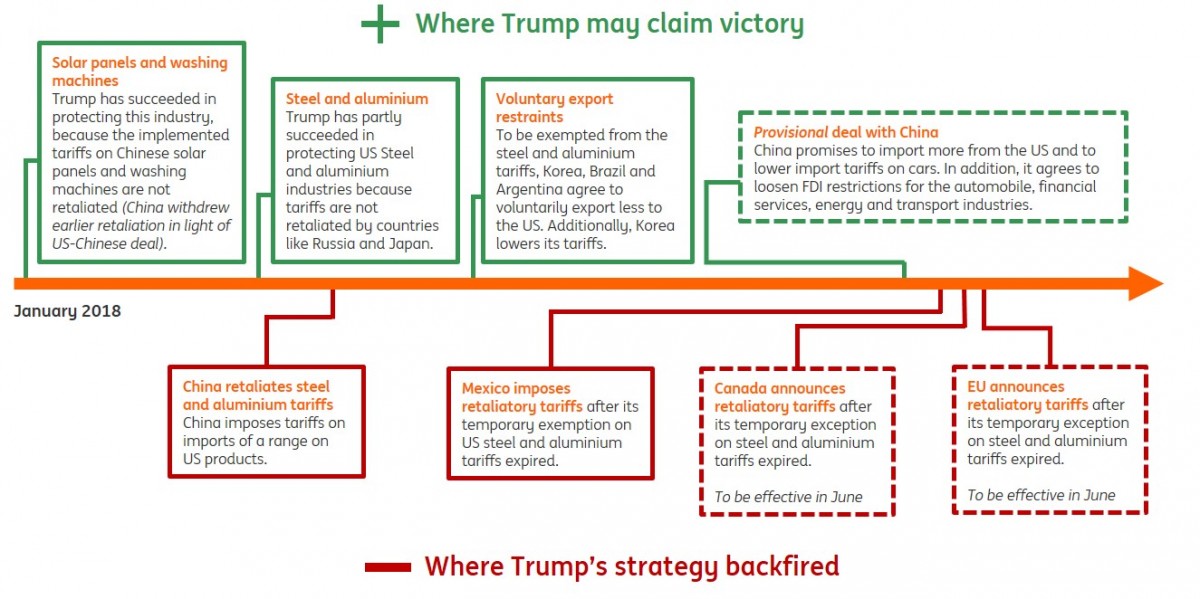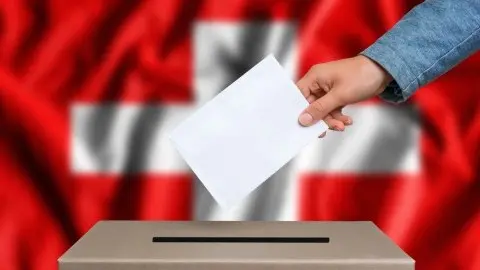G7 Summit: Trump needs to back off to secure his wins
So far President Trump's 'maximum pressure' strategy has worked, but the results are now at risk because China has threatened to take back concessions and the EU, Canada and Mexico have also announced retaliatory measures. At the G7 summit, this Friday President Trump will be pressured to scale down his demands to preserve his gains thus far

Smart tactics
President Trump has said trade wars are good and easy to win. Economists have been keen to point out that trade wars are not good and everyone loses out. Who is right? To answer this, we need to understand what a trade war is.
When economists refer to a trade war, they are referring to countries slapping tariffs on each other. It's easy to explain why everybody loses out in such a situation because the benefits for the domestic industries that are protected by higher tariffs are countered by losses of exports that face higher tariffs as well when retaliation kicks in. Add to this, the loss of purchasing power, because tariffs lead to higher prices and there you go: the net effect on welfare for the two countries is negative. Essentially, a lose-lose situation.
But the trade conflict that President Trump has started is not a real war yet, because retaliation has been limited, at least until last week. Trump has so far practised a 'maximum pressure' strategy that has been quite successful. In March, Trump imposed higher import tariffs on steel and aluminium for all countries and said exemptions would be granted in return for better US trade conditions.
In the past, Donald Trump is the one who has said that deals work best when each side gets something it wants from the other.
Countries like South Korea, Brazil, and Argentina, gave in and ‘voluntarily’ restrained their exports to the US, accompanied by other concessions too. To avoid tariffs on 1333 of their export goods, China has also promised to lower their import tariffs on cars and loosen restrictions on foreign investments in the financial sector, automotive, transport, and the energy sector. The US has given nothing in return, except an exemption for the sanctions on the Chinese company ZTE that was about to be punished for doing business with North Korea and Iran (and even that isn’t a sure thing).
Once the concessions of the trade partners kick in, these bargaining results will not only lead to more domestic sales for US steel and aluminium companies (substitution of imports) but also more exports of US companies in industries like automotive, agriculture and energy. This pushes up US national income and stimulates employment. The welfare loss for the US buyers of steel and aluminium due to the higher price they have to pay has to be taken into account as well, but this will be partly offset by the tariff income for the US government. A precise calculation, using various empirical findings on price sensitivities of demand for imported products, is warranted to derive the effect on US economy as a whole. But the effect will at least be positive for the steel and aluminium industry at the expense of the welfare in the countries that have granted Trump these favours.
More important for the President than the net benefit for the US economy as a whole is the fact that with these bargaining results he lives up to the promises he made to specific industries and their workers.
Pushing it too much
But recent events put these results for Trump at risk.
Last week, the EU, Canada and Mexico announced they would retaliate against higher tariffs for steel and aluminium. And over the weekend, China threatened to take back their commitment to lower tariffs on cars and loosen the restrictions on foreign direct investments if the US doesn't return to its earlier position that imposing tariffs on 1333 Chinese products is no longer an option in the short run.
Mexico and Canada are hugely dependent on American demand for their products, which is why over the last few months they've shown willingness to grant the US more favourable conditions within the North America Free Trade Area (Nafta). Word has it that they were willing to lower the threshold that allows cars to be labelled as Nafta-vehicles so they can qualify for tariff-free trade. They did not go along with the size of the increase that the US originally wanted but still have come a long way.
President Trump might lose it all if he keeps pushing
But other demands from Trump- like a sunset clause that makes a renegotiation of Nafta possible every five years (creating fundamental uncertainty that would make foreign investors wary of investing in the offshore paradise Mexico) have inhibited the closing of a Nafta deal.
China has shown too that it is willing to make sacrifices to save free trade, but not enough in the eyes of President Trump who has demanded an unrealistic reduction of the trade deficit with China by $200 bn in two and a half years. This ambition explains why Trump recalled the recent decision to take away the threat of imposing a 25% tariff on a package of 1333 goods that the US imports from China.
Count your blessings
Many times, President Trump has made clear that for him life is about winning and losing and that he always keeps on fighting to get what he wants. So it's no surprise that the President has already warned the EU that retaliation will lead to another round of tariff elevation, this time for European cars.
This would just be the next logical step in his strategy of using threats to get concessions, but such a step could well lead to further escalation because the US is almost as dependent on the EU as the other way around. This means that Trump does not have the upper hand in negotiations with the EU which makes it easier for the EU to play tough as well.
But in the past, Donald Trump is the one who has said that deals work best when each side gets something it wants from the other.
Let’s hope that he keeps this in mind when he goes to Canada for the G7 summit on Friday, rather than just fighting to win. If he lets go of a few of his most extreme demands he can secure better terms of trade that important trade partners like China, Canada and Mexico have offered him.
Together with the favours that South Korea, Brazil and Argentina have done him already, he can then claim to be the winner. If not, broad-scale retaliation will close in. That would hurt US exports and would turn him into one of the losers of the current trade conflict.
This publication has been prepared by ING solely for information purposes irrespective of a particular user's means, financial situation or investment objectives. The information does not constitute investment recommendation, and nor is it investment, legal or tax advice or an offer or solicitation to purchase or sell any financial instrument. Read more
Tags
TradeDownload
Download article
6 June 2018
In case you missed it: Big week ahead This bundle contains 8 Articles